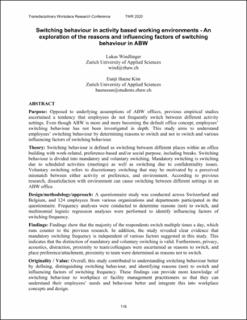Please use this identifier to cite or link to this item:
https://doi.org/10.21256/zhaw-20826| Publication type: | Conference paper |
| Type of review: | Peer review (abstract) |
| Title: | Switching behaviour in activity based working environments : an exploration of the reasons and influencing factors of switching behaviour in ABW |
| Authors: | Windlinger Inversini, Lukas Häne, Eunji |
| et. al: | No |
| DOI: | 10.21256/zhaw-20826 |
| Proceedings: | Future Workspaces : Proceedings of the Transdisciplinary Workplace Research (TWR) Conference 2020 |
| Page(s): | 116 |
| Pages to: | 125 |
| Conference details: | Transdisciplinary Workplace Research (TWR) Conference, Frankfurt, Germany, 16-19 September 2020 |
| Issue Date: | Oct-2020 |
| Publisher / Ed. Institution: | TWR Network |
| Publisher / Ed. Institution: | Frankfurt am Main |
| ISBN: | 978-3-00-066044-3 |
| Language: | English |
| Subjects: | Activity-based working; Switching behaviour; Person-environment interaction; Workplace management |
| Subject (DDC): | 331: Labor economics |
| Abstract: | Purpose: Opposed to underlying assumptions of ABW offices, previous empirical studies ascertained a tendency that employees do not frequently switch between different activity settings. Even though ABW is more and more becoming the default office concept, employees’ switching behaviour has not been investigated in depth. This study aims to understand employees’ switching behaviour by determining reasons to switch and not to switch and various influencing factors of switching behaviour. Theory: Switching behaviour is defined as switching between different places within an office building with work-related, preference-based and/or social purpose, including breaks. Switching behaviour is divided into mandatory and voluntary switching. Mandatory switching is switching due to scheduled activities (meetings) as well as switching due to confidentiality issues. Voluntary switching refers to discretionary switching that may be motivated by a perceived mismatch between either activity or preference, and environment. According to previous research, dissatisfaction with environment can cause switching between different settings in an ABW office. Design/methodology/approach: A questionnaire study was conducted across Switzerland and Belgium, and 124 employees from various organizations and departments participated in the questionnaire. Frequency analyses were conducted to determine reasons (not) to switch, and multinomial logistic regression analyses were performed to identify influencing factors of switching frequency. Findings: Findings show that the majority of the respondents switch multiple times a day, which runs counter to the previous research. In addition, the study revealed clear evidence that mandatory switching frequency is independent of various factors suggested in this study. This indicates that the distinction of mandatory and voluntary switching is valid. Furthermore, privacy, acoustics, distraction, proximity to team/colleagues were ascertained as reasons to switch, and place preference/attachment, proximity to team were determined as reasons not to switch. Originality / Value: Overall, this study contributed to understanding switching behaviour better by defining, distinguishing switching behaviour, and identifying reasons (not) to switch and influencing factors of switching frequency. These findings can provide more knowledge of switching behaviour to workplace or facility management practitioners so that they can understand their employees’ needs and behaviour better and integrate this into workplace concepts and design. |
| URI: | https://digitalcollection.zhaw.ch/handle/11475/20826 |
| Fulltext version: | Published version |
| License (according to publishing contract): | Licence according to publishing contract |
| Departement: | Life Sciences and Facility Management |
| Organisational Unit: | Institute of Facility Management (IFM) |
| Appears in collections: | Publikationen Life Sciences und Facility Management |
Files in This Item:
| File | Description | Size | Format | |
|---|---|---|---|---|
| 2020_Windlinger-Haene_Switching-behaviour-in-ABW-environments_TWR-Conference.pdf | 272.73 kB | Adobe PDF |  View/Open |
Show full item record
Windlinger Inversini, L., & Häne, E. (2020). Switching behaviour in activity based working environments : an exploration of the reasons and influencing factors of switching behaviour in ABW [Conference paper]. Future Workspaces : Proceedings of the Transdisciplinary Workplace Research (TWR) Conference 2020, 116–125. https://doi.org/10.21256/zhaw-20826
Windlinger Inversini, L. and Häne, E. (2020) ‘Switching behaviour in activity based working environments : an exploration of the reasons and influencing factors of switching behaviour in ABW’, in Future Workspaces : Proceedings of the Transdisciplinary Workplace Research (TWR) Conference 2020. Frankfurt am Main: TWR Network, pp. 116–125. Available at: https://doi.org/10.21256/zhaw-20826.
L. Windlinger Inversini and E. Häne, “Switching behaviour in activity based working environments : an exploration of the reasons and influencing factors of switching behaviour in ABW,” in Future Workspaces : Proceedings of the Transdisciplinary Workplace Research (TWR) Conference 2020, Oct. 2020, pp. 116–125. doi: 10.21256/zhaw-20826.
WINDLINGER INVERSINI, Lukas und Eunji HÄNE, 2020. Switching behaviour in activity based working environments : an exploration of the reasons and influencing factors of switching behaviour in ABW. In: Future Workspaces : Proceedings of the Transdisciplinary Workplace Research (TWR) Conference 2020. Conference paper. Frankfurt am Main: TWR Network. Oktober 2020. S. 116–125. ISBN 978-3-00-066044-3
Windlinger Inversini, Lukas, and Eunji Häne. 2020. “Switching Behaviour in Activity Based Working Environments : An Exploration of the Reasons and Influencing Factors of Switching Behaviour in ABW.” Conference paper. In Future Workspaces : Proceedings of the Transdisciplinary Workplace Research (TWR) Conference 2020, 116–25. Frankfurt am Main: TWR Network. https://doi.org/10.21256/zhaw-20826.
Windlinger Inversini, Lukas, and Eunji Häne. “Switching Behaviour in Activity Based Working Environments : An Exploration of the Reasons and Influencing Factors of Switching Behaviour in ABW.” Future Workspaces : Proceedings of the Transdisciplinary Workplace Research (TWR) Conference 2020, TWR Network, 2020, pp. 116–25, https://doi.org/10.21256/zhaw-20826.
Items in DSpace are protected by copyright, with all rights reserved, unless otherwise indicated.